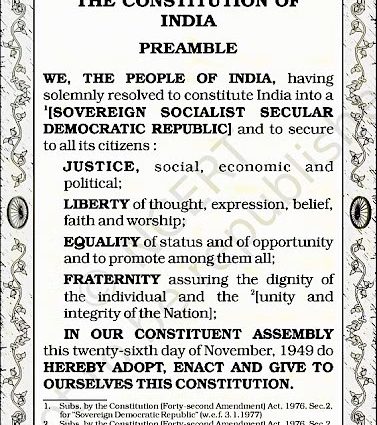By Stanislaus Alla
New Delhi, Jan 26, 2024: Among the key words and adjectives found in the Preamble of Indian Constitution, ‘sovereign’ is a word that is little understood and discussed. Qualifiers such as socialist, secular, democratic, and principles like justice, liberty, equality and fraternity come more easily into our conversations.
Perhaps many of us have noticed that there is no reference to ‘God’ in the Constitution’s Preamble. While it was in the making, suggestions did come up to add in the Preamble a phrase like ‘In the name of God’ or ‘God’ but the idea was voted out. Considering faith as a personal/private matter, and giving freedom to people to practice the religion of their choice, the framers of the Constitution opted not to refer to God directly in it.
The ‘WE’ with which the Preamble begins is a mighty and weighty ‘we.’ It simply means that ‘power’ rests with people, with the newly-freed people who are giving themselves a Constitution, a charter, and a way of life to be defined and determined by it. Till now, power, in the old order, rested with God or with the monarch or with other entities or forces but now it is shifting -to rest in the will of the people. In this process a nation finds its soul in the collective will of the people.
Kings and queens, monarchs and chiefs, i.e. all but the ordinary people, had limited or unlimited power with them; and now, in a democracy, power is going to rest with people. Sociologists remind us that the modern democracies are founded on this tectonic change, a renewed understanding of who they are and the others are, and how to configure power in the new framework of governance.
In this epochal shift a) people begin to recognize that they have power in themselves, to shape their destinies, b) they opt willingly to transfer this power to others who in turn will administer all on behalf of the community, and c) that the goal of this entire enterprise is to achieve greater common good, evolving a system that will work for the wellbeing of all, not for a privileged few.
Sovereign in the Preamble implies much of this. We freed ourselves from British rule, and chose not to empower any individual or a group to rule over us. Those elected to govern the people will do so with the wings they have at hand -the legislature, the executive, the judiciary and the administrative. Several others, such as the media, emerge to play a critical role in this mode of governance.
The question is, do people in the first place know that power rests with them, and that it is this power that is handed over to others for a particular purpose! Having lived under the other rulers who wielded immense power over them (be they monarchs or those who had power by virtue of belonging to privileged castes or ethnicities or lineages), it is difficult for many Indians to imagine that power rests with them. If they had already internalized that some are born or entitled to be served, it will take a long time for the people to free themselves, and to know that they possess power.
Christianity states clearly that God made us, all people, in God’s image and likeness, and that dignity and equality and rights are innate to all, and that they are inalienable and inviolable. Of course, we believe that God has absolute power and we have limited power, along with the gift of reason to live responsibly.
While we agree with the meaning given to ‘sovereign’ by social scientists, we should recognize that power is a divine gift, not given for self-glory or for destroying oneself or the others but to work for the wellbeing of all, including oneself. Gospel values, embedded in the Indian Constitution, especially in the Preamble, challenge us to empower people, especially the poor who have not realized their power and potential.
Declaring ourselves a ‘Republic’ implies recognizing and claiming ‘power’ that is innate to us, and transferring it only to those who will work for the wellbeing of all, transcending regional, religious, ethnic and linguistic barriers.
In order to do that we must foster a culture that will strengthen the democratic processes, a culture to which discussion and participation are central and indispensable. Sovereign power is most manifested in voting.

